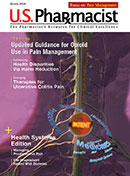US Pharm. 2015;40(3):1.
One thing I’ve learned during my years in this profession is that pharmacists have strong opinions and are not shy about voicing them. That’s why we feature a poll every month on the U.S. Pharmacist website ( www.uspharmacist.com). Though this poll may not be considered statistically valid by some standards, it does allow us to quickly take the pulse of pharmacy on a number of issues. Over the last half decade, in fact, we have posed some 70 questions to pharmacists visiting the site. The results are immediately tabulated and available so that you can see how your answer stacks up against those of other pharmacists. While space does not allow me to list all the questions, I’ve chosen some I thought would be of interest to most pharmacists.
In 2009, during the “big recession,” we wondered if the slumping economy was having an effect on prescriptions being filled or refilled. The results were basically even: 41% of respondents said prescription fill/refill rates had become a major problem, but 32% responded that these had remained basically the same, and another 19% said that while prescriptions were being filled, they were not being picked up. That same year, we polled pharmacists about where they prefer to get their CE credits. A resounding 60% of poll takers preferred online CEs. (Don’t forget to check out U.S Pharmacist’s monthly online CE lessons.)
In 2010, before marijuana use was legalized as widely as it is today, pharmacists were split in their responses about whether they supported the use of medical marijuana. Thirty-one percent said, “Yes, but only as an Rx to treat specific illnesses”; 30% said, “Yes, but it should be an OTC regulated like alcohol”; 37% said, “No, it would cause more widespread drug abuse”; and only 2% said they were not sure about their answer. If we asked the same question today, I wonder what the response would be? That same year, we were curious to learn whether pharmacists thought they should follow a dress code. Sixty-eight percent of respondents said, “Yes, a uniform like a white lab coat promotes professionalism”; just slightly more than one-third of the responders said, “No, a professional attitude is more important than appearance”; and 2% were not sure.
It isn’t very often that the results show a landslide on one question, but when we asked retail pharmacists if their pharmacy had been affected by drug shortages, their answers were nearly unanimous, with 96% saying, “Yes, it has been difficult to find appropriate substitutes.”
Responses to some questions took us by surprise. In 2012 we asked pharmacists if they were concerned about counterfeit drugs in their practice, and three-quarters of those who answered said yes. Not unexpectedly, we received a definitive response from pharmacists when we asked if they supported physician dispensing of drugs. Ninety-six percent said, “No, there are too many safety concerns without pharmacist oversight.” Last year, we asked pharmacists if they thought antibiotics were overprescribed. The vast majority (91%) said, “Yes, antibiotic resistance is a major concern.”
Be sure to let your opinions be heard by participating in future U.S. Pharmacist polls. If you have any suggestions for future poll questions, we want to hear from you. Please send your submissions to editor@uspharmacist.com. We are happy to report that the pulse of pharmacists remains strong and the profession is alive and well.






